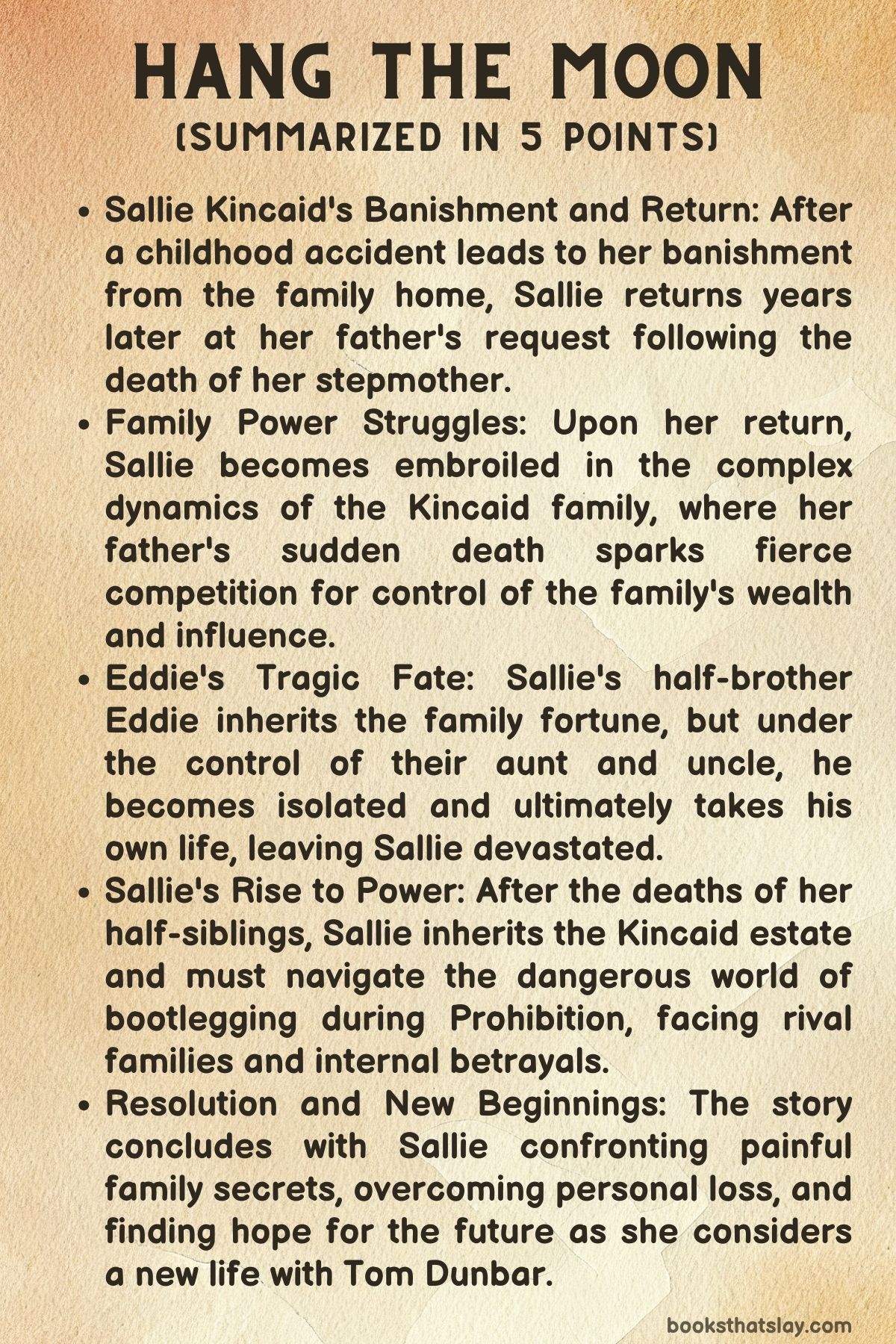Hang the Moon Summary, Characters and Themes
Hang the Moon by Jeanette Walls is a historical fiction novel set against the backdrop of Prohibition-era Virginia. The story follows Sallie Kincaid, a young woman determined to reclaim her place in a powerful family that once cast her out.
As Sallie navigates complex family dynamics, secrets, and the treacherous world of bootlegging, she faces both personal and societal challenges. Walls’ narrative is rich with intrigue, betrayal, and the fierce pursuit of survival, making “Hang the Moon” a riveting exploration of resilience and redemption in a time of great upheaval.
Summary
At just eight years old, Sallie Kincaid’s world is defined by the powerful presence of her father, Hank “the Duke” Kincaid, and the luxurious but oppressive environment of the Big House in Caywood, Virginia. Living with her father, her stepmother Jane, and her young half-brother Eddie, Sallie is haunted by the shadow of her late mother, Annie, whose scandalous reputation lingers in the town’s collective memory.
When an innocent game with her wagon results in an accident that leaves Eddie injured, Jane seizes the opportunity to banish Sallie from the family home, accusing her of attempted murder. The Duke, prioritizing peace in the household, sends Sallie away to live with her estranged Aunt Faye in the remote area of Hatfield.
Nine years later, now a teenager, Sallie has grown accustomed to her new life, resigned to the idea that she might never return to her childhood home.
Her routine is upended when Tom Dunbar, a former friend and loyal employee of the Duke, arrives with unexpected news: Jane has died, and the Duke wants Sallie to return to the Big House. Back in Caywood, Sallie discovers that her father has plans for her to take on the role of caretaker for Eddie, whom he sees as his heir.
The Duke’s return from a business trip with a new wife, Kat, stirs up fresh tensions. During a family picnic orchestrated by Kat, tragedy strikes when the Duke dies in a reckless jump from a trestle into the river. Eddie, being the Duke’s only son, inherits the family fortune, but as a minor, his control is limited.
The Duke’s sister, Mattie, along with her husband, Sheriff Earl, assumes authority over the family’s wealth and estate. Sallie finds herself caught in a web of power struggles, exacerbated by the looming threat of Prohibition and the tensions it brings to the county.
The conflict intensifies when Mattie obtains legal custody of Eddie, separating him from the family home. The isolation and pressure prove too much for Eddie, who tragically takes his own life. Sallie is consumed by guilt and sorrow, believing she could have done more to protect her brother.
Following Eddie’s death, the Kincaid legacy passes to Mary, the daughter of the Duke’s first wife. Mary, resentful of Sallie’s mother, uses her new authority to push forward her own ambitious reforms. However, Mary’s reign is short-lived as she succumbs to a terminal illness, leaving Sallie to inherit the entire estate.
Sallie’s newfound power brings its own set of challenges, particularly in the cutthroat world of bootlegging. Amidst these dangers, she forms a romantic connection with Douglas Rawley, an alliance that seems to promise a brighter future.
But when Sallie learns that Rawley has betrayed her by fathering a child with her half-sister Nell, she is forced to confront painful truths about her family’s dark past, including the tragic fate of her mother, Annie, at the hands of the Duke.
In the aftermath of Rawley’s departure and the burning of the Big House, Sallie is left to piece together her life. A chance recollection of her mother’s parting words offers her a glimmer of hope.
When Tom Dunbar returns, revealing his own marital troubles, Sallie proposes a future together, one marked by cautious optimism and the possibility of finally finding peace.

Characters
Sallie Kincaid
Sallie Kincaid is the novel’s protagonist, a strong-willed and determined young woman who navigates a tumultuous life marked by family conflicts, societal expectations, and personal loss. From a young age, Sallie is fiercely independent, demonstrating resilience in the face of adversity.
After being banished from the Big House following the accident involving her half-brother, Eddie, she grows up away from the wealth and privilege she was born into. Her return to the Big House marks the beginning of her struggle to reclaim her place within her family and society.
Sallie’s character is defined by her sense of duty and loyalty, particularly toward her family, despite the many betrayals and secrets that surround them. She carries the weight of guilt for Eddie’s death and the burden of managing the Kincaid legacy, which forces her to navigate the dangerous world of bootlegging during Prohibition.
Sallie’s journey is one of self-discovery, as she confronts the truth about her family’s dark past and her own identity. Her ultimate survival and determination to forge her own path reflect her growth from a naive girl to a formidable woman who understands the complexities of power, love, and loyalty.
Hank “the Duke” Kincaid
The Duke is Sallie’s father and a central figure in the town of Caywood. He is a powerful and influential man, known for his control over the local economy and his ruthless methods of maintaining that power.
The Duke’s personality is a blend of charm and tyranny; he is both a beloved figure and a feared one. His influence extends beyond his family to the entire community, where he is seen as a patriarchal figure.
However, his relationships with his family members are complicated and often toxic. His favoritism towards his children is apparent, particularly in his plans for Eddie, whom he intends to mold in his own image.
The Duke’s sudden death leaves a power vacuum in the Kincaid family, leading to a series of conflicts over control of the family’s wealth and influence. His legacy is a double-edged sword for Sallie, who inherits not only his fortune but also the enemies and challenges that come with it.
The Duke’s character embodies the duality of power—its ability to provide security and its potential to corrupt and destroy.
Eddie Kincaid
Eddie, Sallie’s half-brother, is a tragic figure whose life is marked by the expectations and pressures placed upon him by his father, the Duke. Despite being the heir to the Kincaid fortune, Eddie is a sensitive and fragile boy, unable to live up to his father’s harsh standards.
The accident that injures him as a child and leads to Sallie’s banishment foreshadows his later struggles with the burden of inheritance. Eddie’s inability to cope with the responsibilities thrust upon him, combined with the manipulations of other family members, culminates in his tragic suicide.
His death serves as a pivotal moment in the novel, highlighting the destructive nature of the Kincaid family dynamics and the immense pressure that comes with power and privilege. Eddie’s character represents the vulnerability that lies beneath the surface of wealth and power, and his demise underscores the novel’s themes of loss, guilt, and the heavy cost of familial expectations.
Jane Kincaid
Jane is Sallie’s stepmother and Eddie’s mother, who harbors a deep resentment toward Sallie, stemming from her jealousy and dislike of Sallie’s mother, Annie. Jane’s animosity toward Sallie is evident from the beginning, culminating in her role in Sallie’s banishment after the accident involving Eddie.
Jane’s character is defined by her insecurities and her desperate attempts to secure her place within the Kincaid family. Her death, which occurs shortly after Sallie’s return to the Big House, marks a turning point in the story, leading to the Duke’s quick remarriage and the subsequent upheavals in the family.
Jane’s influence on the Kincaid household, though short-lived in the novel, is significant in shaping Sallie’s early experiences and the dynamics within the family. Her character reflects the precarious position of women in the Kincaid world, where their value is often tied to their relationships with powerful men.
Mattie Kincaid and Sheriff Earl
Mattie is the Duke’s sister, and Sheriff Earl is her husband. Together, they represent the traditional, conservative forces within the Kincaid family, seeking to maintain control over the family’s wealth and influence after the Duke’s death.
Mattie’s decision to gain custody of Eddie and her manipulation of the family’s affairs highlight her ambition and ruthlessness. She is a pragmatic character, willing to do whatever it takes to secure her position and ensure that the Kincaid legacy remains intact.
Sheriff Earl, as the lawman of the town, complements Mattie’s ambitions with his authoritative presence. Together, they embody the older generation’s desire to cling to power, even at the expense of family unity and individual well-being.
Their actions contribute to the novel’s exploration of family loyalty, power struggles, and the moral compromises that come with maintaining control.
Mary Kincaid
Mary is the daughter of the Duke and his first wife, Belle. She inherits the Kincaid business and the Big House after Eddie’s death.
Mary’s character is shaped by her resentment toward Sallie’s mother, whom she blames for the failure of her parents’ marriage. Her tenure as the head of the Kincaid family is marked by her attempts to implement political and religious reforms, reflecting her desire to leave her mark on the county.
However, her efforts are cut short by her battle with uterine cancer, which ultimately claims her life. Mary’s character illustrates the complexities of family loyalty and the ways in which past grievances can influence present actions.
Her death leads to Sallie inheriting everything, further complicating Sallie’s sense of responsibility and guilt.
Aunt Faye
Aunt Faye is Sallie’s mother’s sister, who takes Sallie in after she is banished from the Big House. Faye is a maternal figure in Sallie’s life, providing her with a sense of stability and belonging during her years away from the Kincaid family.
However, Aunt Faye also harbors secrets about the Kincaid family’s dark past, particularly concerning the fate of Sallie’s mother, Annie. These revelations are crucial in Sallie’s journey of self-discovery and understanding her place within the family.
Aunt Faye’s character serves as a bridge between Sallie’s past and present, offering her both the love she lacked from her immediate family and the truth about the circumstances that shaped her life. Faye’s role in the novel highlights the importance of female bonds and the ways in which women navigate the oppressive structures of their society.
Douglas Rawley
Douglas Rawley is a character who initially seems to offer Sallie a chance at love and escape from the burdens of her family responsibilities. However, his affair with Nell, Aunt Faye’s daughter, reveals his true character and shatters Sallie’s hopes for a new life.
Rawley’s betrayal forces Sallie to confront the realities of her relationships and the limits of her trust. His departure from Sallie’s life is a pivotal moment that underscores the novel’s themes of betrayal, disillusionment, and the complexities of love and loyalty.
Rawley’s character serves as a catalyst for Sallie’s final transformation, pushing her to embrace her independence and take control of her own destiny.
Tom Dunbar
Tom Dunbar is a childhood friend of Sallie and an employee of the Duke. He plays a crucial role in bringing Sallie back to the Big House after Jane’s death and remains a constant presence in her life throughout the novel.
Tom’s loyalty to Sallie is unwavering, and his eventual romantic relationship with her offers a glimmer of hope for her future. Despite the challenges they face, including Tom’s own complicated personal life, his relationship with Sallie represents a potential for stability and partnership.
Tom’s character is a contrast to the other men in Sallie’s life, offering her a chance at genuine connection and understanding. His presence in the novel highlights the theme of enduring loyalty and the possibility of redemption and happiness amidst the turmoil of Sallie’s world.
Themes
Family and Loyalty
One of the most prominent themes in the novel is the intricate web of family loyalty and betrayal. Sallie’s relationship with her family is marked by deep-seated tensions, rivalries, and the constant push-and-pull between love and resentment.
The bond between family members is both a source of strength and a cause of immense suffering for Sallie. Her banishment from the Big House after the accident with Eddie sets the stage for a lifetime of complex family dynamics.
Upon her return, Sallie is thrust into a power struggle over the Kincaid legacy, where loyalty to her family often conflicts with her own sense of justice and morality. The deaths of Eddie and Mary further complicate these relationships, as Sallie is left to grapple with feelings of guilt, responsibility, and a sense of duty to uphold her family’s honor.
Identity and Self-Discovery
Sallie’s journey throughout the novel is also one of self-discovery and identity. From her early years under the shadow of her father, Hank “the Duke” Kincaid, to her eventual rise as the head of the family, Sallie’s identity is constantly shaped and reshaped by the events around her.
The loss of her mother at a young age and the disdain from her stepmother Jane contribute to Sallie’s struggle to find her place within the family and society. Her return to the Big House after years of exile marks the beginning of her quest to reclaim her identity and assert her authority in a male-dominated world.
The revelations about her mother’s tragic fate and the secrets surrounding her family further complicate Sallie’s understanding of herself, forcing her to confront the darker aspects of her lineage. Ultimately, Sallie’s journey is about finding her own voice and coming to terms with the past in order to forge a future on her own terms.
Power and Control
The theme of power and control permeates the novel, particularly in the context of the Kincaid family’s influence over Caywood and the surrounding areas. The Duke’s dominance in the town and his manipulation of those around him establish a legacy of control that Sallie inherits.
After the Duke’s death, the struggle for power within the family intensifies, with various members vying for control over the Kincaid Holdings. Sallie’s efforts to maintain neutrality are met with increasing challenges as she is forced to navigate the dangerous world of bootlegging and Prohibition-era politics.
The power dynamics within the family are further complicated by gender, as Sallie must assert herself in a world that often seeks to undermine her authority simply because she is a woman. Her eventual rise to power is marked by both triumph and tragedy, as she learns that control often comes at a steep personal cost.
The Impact of Societal Norms
Set during the Prohibition era, the novel also explores the impact of societal norms and the legal constraints of the time. Prohibition serves as a backdrop for the Kincaid family’s struggles, as their involvement in bootlegging becomes a means of survival and power.
The rigid societal expectations surrounding gender, class, and morality further complicate Sallie’s journey. As a woman in a male-dominated society, Sallie faces numerous obstacles, from the stigma attached to her mother’s reputation to the challenges of being taken seriously as a leader.
The novel also touches on the role of religion and politics in shaping the social order, particularly through the character of Mary, who uses her position to initiate reforms in the county. However, these societal norms are often portrayed as restrictive and hypocritical, with characters like Sallie pushing back against them in order to carve out their own path.
Resilience and Survival
Finally, the theme of resilience and survival is central to Sallie’s character arc. Despite the numerous setbacks and tragedies she faces, Sallie remains determined to persevere and protect her family’s legacy.
Her resilience is evident in her ability to adapt to changing circumstances, from her initial exile to her eventual role as the head of the Kincaid family. Sallie’s involvement in the dangerous world of bootlegging is a testament to her survival instincts, as she learns to navigate the treacherous waters of Prohibition-era America.
The novel highlights the strength and determination required to survive in a world fraught with danger and uncertainty. Sallie’s journey is a powerful testament to the human spirit’s capacity for endurance in the face of adversity.


